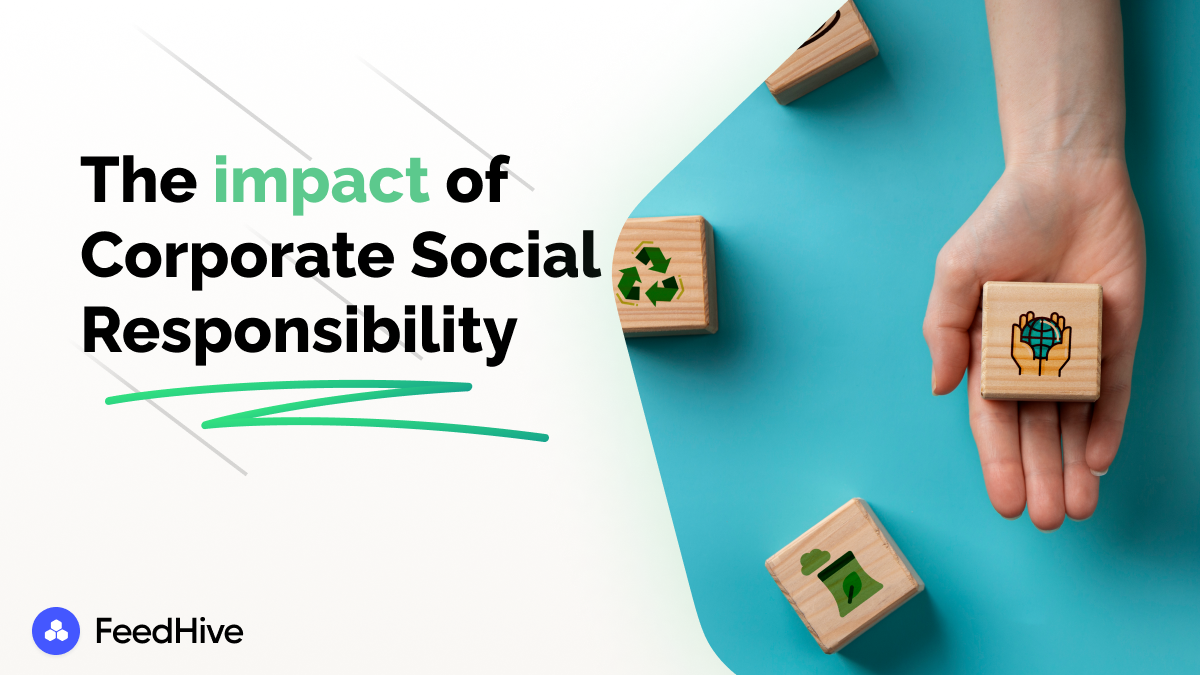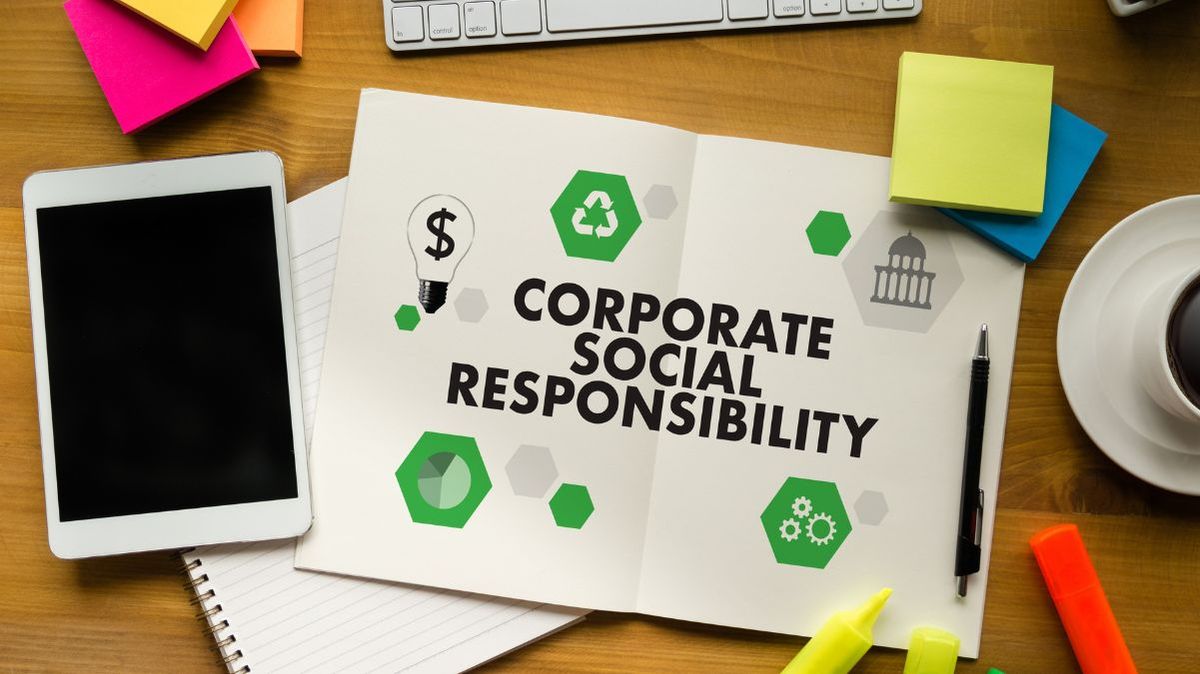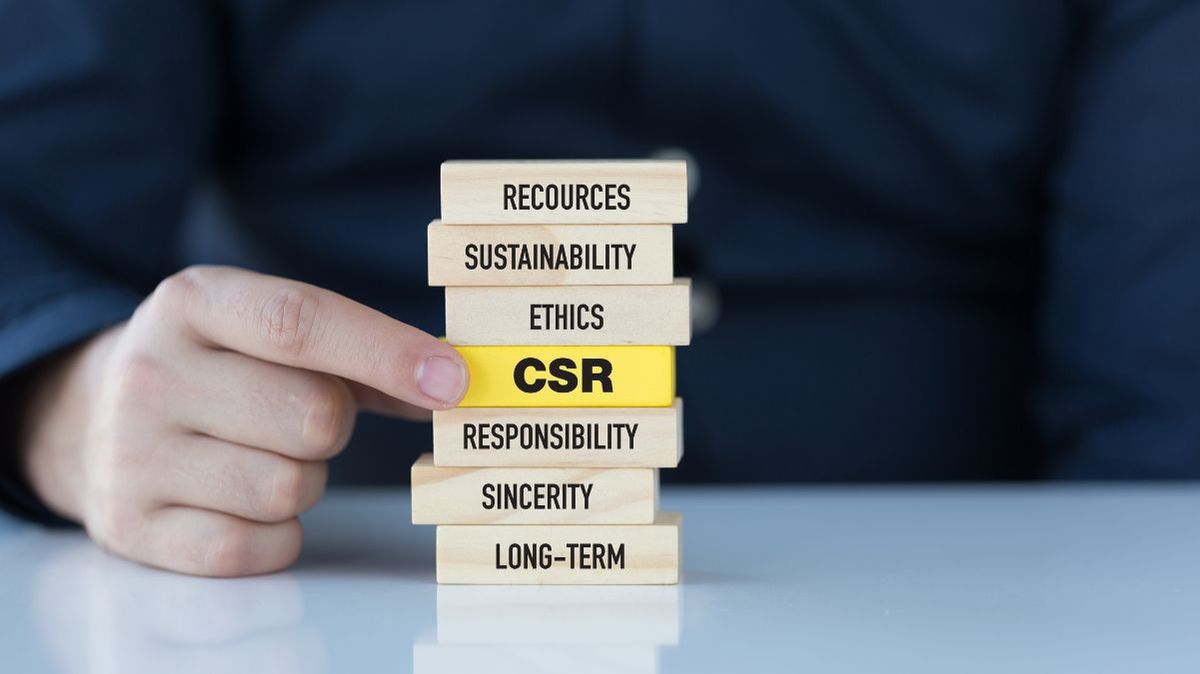
“A business that makes nothing but money is a poor business.”
– Henry Ford
Even after years of evolution in business, this ancient wisdom by a notable American industrialist stands the test of time. The company’s financial assets are undoubtedly important, but it's worth for the consumers depends on much more. They now prefer brands emerging in the corporate social responsibility landscape with a true sense of giving back to the community.
The businesses that go above and beyond to promote eco-friendliness, sustainability, and philanthropic gestures not only sustain a positive public image but also set the stage for a better tomorrow. These steps encourage customers to join them in a meaningful cause and do their duty as responsible citizens, ultimately paving the way for long-term businesses growth.
In this blog, you will gain an insight into all the ins and outs of corporate social responsibility — What is it? Why should businesses embrace it? And how it helped other companies generate holistic benefits throughout the globe. So, let’s get started without further ado!

In simple words, Corporate Citizenship, widely known as Corporate Social Responsibility (CSR), is a self-accountability model designed for businesses to evaluate their impact on social, economic, and environmental scales. Mostly, when companies shape their CSR plans, they commit to a three P’s policy, which includes
Corporate Social Responsibility is an umbrella term that covers a company’s ethical values, legal aspects, and philanthropy efforts besides their social and environmental initiatives.
Prioritizing people in your CSR program means to devise strategies that ensure transparency about your product quality, supply chain, and goods distribution. Businesses usually achieve that by
It also means to set up a culture that offers discrimination and harassment-free working conditions to employees with fair wages. Moreover, companies can engage in philanthropy to give back to the less fortunate community through fundraisers, charities, or non-profit organizations.
People now opt for brands that think beyond profit and about the planet. That's what the second P in CSR is suggesting to the business owners. So, companies often perform their duties toward the environment by
The main aim of a business is to generate profit regardless of all its efforts to serve environmental and social causes. Therefore, companies should ensure that they equally balance their revenue goals with social, ethical, and environmental commitments. It's only possible if they consider:

Corporate social responsibility examples from throughout the globe provide enough evidence to place it on top of the business priority list. If you want to know why CSR strategies are crucial and how adhering to them can transform your global business profiles, keep reading, as in this part, we will discuss its full-scale benefits in the corporate world.
So, let’s begin!
A 2022 case study on one of the McDonald's franchises revealed a significant correlation between CSR strategy and brand awareness. That means when businesses practice an ethical approach and engage local communities to fight against social issues, they stand out in the corporate world, leading to a strong brand presence and selling opportunities.
Brands that tie their marketing strategy with a social cause can effortlessly thrive in the business community. For Instance, with each sold item, Warby Parker commits to donating a pair of prescription glasses to those in need. These compassionate values resonate with the consumers and build trust in the label, leading them to purchase from that brand more often.
Money-driven business is a thing of the past. 40% of consumers now look for brands that are driven by purpose, meaning not only do they share a strong stance on social issues but also contribute to bringing positive change. Many renowned brands like Coca-Cola, Tesla, and Google have integrated their business model with CSR policies to attract genuine customers.
Businesses are heavily influenced by public opinion as word of mouth starts creating a ripple effect. According to the latest statistics, 76% of companies agree that businesses can lower the risk of poor brand reputation through CSR, which portrays the brand as socially responsible. As people often feel more aligned with a business that prioritizes people over profit, this strategy results in a positive public perception.
55% of online customers are willing to pay extra for items sold by socially and environmentally responsible companies, according to a Git Nux market survey. That means adhering to corporate social responsibility in business is a robust way to raise your capitalization value in the market. Because slick marketing of CSR influences consumer behavior and leads to organic profits.

The concept of corporate social responsibility for businesses is not just a goodwill gesture anymore but an approach to dominate the hearts and minds of customers. With a well-grounded CSR strategy, companies create value in the market among like-minded customers, which makes them stand out from their competitors focused on short-term profits.
For that reason, developing a calculated CSR approach is fundamental to flourishing your business for good. So, let’s go through a step-by-step procedure and see how you can work out a CSR model that aligns with your business.
Your first and foremost priority in crafting a CSR model is your own business. Yes, you heard that right!
Assess what your business demands and how it can share a space with current social, environmental, legal, or economic issues. For instance, if you own an air travel company, the CSR plan should focus on mitigating the carbon footprint and reducing the environmental impact of air pollution.
Composing a whole CSR draft isn’t as simple as it sounds. In the second step, you should connect with stakeholders, business owners, employers, and CSR experts for detailed discussions. These insights will give you a blueprint to use for crafting an effective CSR strategy.
A plethora of famous businesses around the globe have laid their foundations on CSR programs and conscious marketing, with Google, Microsoft, Patagonia, and Apple sharing just the tip of the iceberg. Read the documents or take inspiration from their CSR experts, and you will get a solid idea on how to design your CSR business model.
Set clear objectives and establish what you want to achieve through your efforts after your CSR goals are clear. For example, you can enlist a time limit for reaching a carbon-neutral status for an air travel firm. These key performance indicators help companies keep track of their progress while improving their overall performance.
Allocating financial resources for the execution of the CSR program is the most vital step. You can hire a CSR expert for that purpose, as they will help you identify the key priority areas while allowing you to waive the extra expense and effort.
Greenwashing, also known as green sheen, is a type of media marketing that manipulates consumers with false marketing. It takes place when companies use their marketing revenue to influence consumer behavior through a facade of sustainable or environment-friendly products.
One such example is the public boycott of Green Mountain for promoting environmentally harmful energy sources as ‘’green energy.’’
The practice of greenwashing while strategizing for a corporate social responsibility model is a looming threat to your business. When companies make promises that don’t align with their actions, it results in a negative public sentiment that strongly impacts businesses in the long run.

More than fifty percent of companies with an integrated CSR program experienced a sustainable business in the last three years. This figure shows how a good CSR plan is critical for leading a successful business. So, join us as we explore real-life corporate social responsibility examples and witness how they have transformed the market landscape.
The outdoor accessories and apparel brand United by Blue is at the forefront of corporate social responsibility to fight ocean and waterway pollution. Every day, more than 38 million pounds of trash is dumped into oceans, and according to the company’s founder, Brian Linton, this crushing number is a driving force behind their mission.
Their journey started with a pledge to clean one pound of marine debris from the oceans with each sold item, and up until this day, they have recruited more than fifty thousand volunteers to join them in this cause. With 12 years of expertise in waterway clean-ups, the company now holds a central space with several organizations, such as B Corp or the United Nations.
The consistency and transparency in their efforts don’t end here. From sourcing regenerative fibers to collecting recycled materials, the company endeavors for sustainable products every step of the way. Moreover, they work with manufacturing partners following the Supplier Code of Conduct to promote a work-friendly environment with neutral wages and fair working hours.
The bookstore company – Better World Books – undertakes one of the most inspiring corporate social responsibility examples through a global impact. Two of their main goals include donating a book every time someone purchases one from their website and funding literacy programs worldwide to reduce global poverty through education.
As a part of their commitment to promote environmental sustainability, they carefully recycle or reuse the books instead of discarding them into landfills. Thus far, the company holds onto a remarkable figure with 26 million donated and more than 320 million recycled books. They have also crossed the 28 million threshold in funds for libraries or non-profit organizations worldwide.
One of their six core values includes prioritizing ‘’people, planet, and profit,’’ which displays their concern about bringing a constructive change in society through their business. With a clear vision and heartfelt labor to uplift societal norms, the company ranks third in the most used book sites, indicating its well-received image by consumers.
The natural skincare product company has laid the most solid foundations of following corporate social responsibility programs for three decades. Their fundamental goal is to give back to nature and show a true dedication to preserving it. That is because most of their products originate from natural ingredients.
One of the company’s co-founders, Roxanne, states their mission and quotes:
“We take from nature, so we must respect and preserve it.”
They have made commendable efforts to incorporate social responsibility in business by switching to renewable electricity and recyclable packaging. From the start, the company made a policy to keep 1.5 million pounds of trash out of the oceans, and so far has stuck to it. They venture by initiating environmentally friendly projects that open the doorways to preserve lands.
Co-founder Roxanne bought land at the expense of the company’s lip balm and sold it to the National Park Services for conservation. According to its 2020 impact report, the company also aims to go 100% plastic-free in its packaging. Such values sit right with the consumers across the globe, leading to an 80% customer satisfaction rate.
Interface is a global manufacturer of luxury flooring with an immense variety of vinyl and carpet tiles. They share a sincere devotion to work in alliance with comprehensive policies that strictly oppose slave labor, child labor, and human trafficking. Hence, the company's socially conscious work ethic makes it the top choice of consumers around the globe.
Additionally, the founders introduced a culture of diversity and inclusivity in business, ensuring the protection of employees from harassment of any sort. In 2022, they finalized a global human management capital system that offers access to the employment data categorized by gender, race, identity, and job, allowing them to spot deficiencies in their working patterns.
The company took its social responsibility efforts a step ahead after achieving a carbon-neutral status in 2020. Now, they sell carbon-negative tiles that retain the carbon footprint from the atmosphere. As stated in the 2022 impact report, one of their main objectives is to reduce greenhouse emissions to half and employee commuting emissions to 30% by 2030.
Etsy trades diverse vintage products, including jewelry, home decor, bags, toys, furniture, and crafts. The unique e-commerce brand openly endorses advocating for creative entrepreneurs and a safer planet as a part of its public policy rules. Being certified as a B Corp, the company holds a credible status in terms of economic, social, and ecological impact on the environment.
It operates on a low-waste model and recruits volunteers to transport the waste to rural farms for composting. This thoughtful policy has laid the foundations for sustainable agricultural practices. With its valuable collaborations all across the globe, the company has also supported an overwhelming amount of local artists to establish their work for a sustainable income.
In 2018, the CEO, Silvermann, addressed racial inequality and pledged to double the number of Black and Latinx employees by 2023. He also took a lead in corporate philanthropy by funding people of color for local support. As for its role in environmental benefit, the company met the goal of a net-zero carbon footprint in 2019 while still investing for zero greenhouse gas emissions.
Kentucky Fried Chicken, most popularly known as KFC, holds a special place for all the chicken lovers around the map. However, the company remained in the spotlight for several controversies in the last few years but managed to restore its reputation by systematic incorporation of CSR policies into its work ethic.
Over the years, KFC has adhered to conscious product strategies, including strict sanitation, a rigid shelf life system, and quality distribution procedures. It has also partnered with Next Gen Consortium and NewYork Declaration in Forests to meet sustainable goals and reduce deforestation risks. Moreover, the company aims to achieve a net-zero emission status by 2050.
The workforce fosters a trend of giving back to the community through their social responsibility initiatives to fight against hunger. They raised almost 270,000 dollars in the fourth quarter of 2022 to donate meals while each franchise participated in the cause. Besides these efforts, the company also runs social media campaigns time and again to recognize young talent and skill.
The Reformation Clothing brand offers expensive rates, but consumers pay such costs with an open heart due to the company’s high-end corporate social responsibility ethics. It believes in practicing employment equality and spending part of its profits on educating them about social causes. Also, the factory operates in line with the Fair Labour Association to ensure work safety.
They are open in their dealings with consumers and regularly publish sustainability reports on their websites for transparency. The fabrics and materials they use have a recycled value of close to 90%. However, the company’s utmost efforts to address this gap are visible as they have pledged to source 100% recyclable materials by 2025.
Through its genius marketing, Reformation has introduced a return policy that incentivizes customers to return abandoned brand items in exchange for credits. The company then reprocesses them into newer products, reducing the overall impact on climate. In addition, it has been 100% carbon neutral since 2015, with an official announcement still in the queue.
Brands with poorly executed CSR strategies often work in patch gestures, which means they only engage in social causes for marketing purposes without any long-term commitment to making a real difference. While it gives a short-term boost to their brand image, they are more likely to bear the negative impact sooner or later.